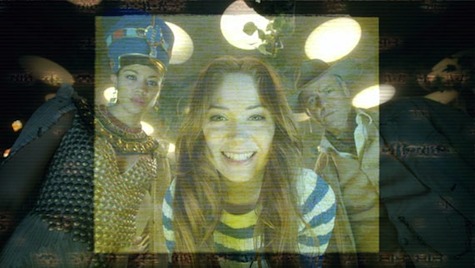Another week gone, another Doctor Who episode ingested, another… wait, Steven Moffat just deleted his Twitter account?
The latest from the Who corner seems to have polarized fans in a strange way. To be sure, the episode “Dinosaurs on a Spaceship” was full of several disparate elements that (for me, at least) came together fine enough of you didn’t squint too closely. It was fun and silly, and contained certain elements that I have missed that were more familiar on the show three or four seasons back. There was just one aspect of the episode that seemed to have itself woefully confused.
It was the part where we seemed to be getting that class in “gender studies” that Amy referred to three-quarters of the way in.
For the official records: we have no way of knowing if Steven Moffat deleting his Twitter account has anything to do with backlash from “Dinosaurs On A Spaceship.” We do know that Moffat did receive a fair share of criticism (most of it likely poorly worded and rife with web spellings) on the platform, and has lashed out in response to it before. With that in mind, does it seem likely that fans griping about the episode led him to pull the plug on his tweets? There’s a fair chance.
But what could they have been complaining about in the first place? The murder of Solomon? The portrayal of minorities? The fact that Amy and Rory are now in their thirties and we still have no substantial timeline of their adventures to work with? It could be any of those things, to be sure.
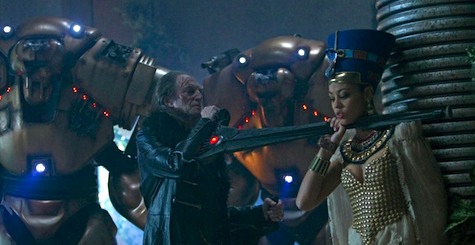
Or it could be that this is the first episode of new series Doctor Who in which rape has been threatened?
No, the threat was not explicit, but it was incredibly implicit in everything about the way that Solomon spoke and physically interacted with Queen Nefertiti. We all know what allusions to “breaking in” an animal are meant to infer when you’re discussing a woman you are taking as a prisoner. It was easily the episode’s lowest point, but that does not mean that the whole venture was poorly handled. In fact, it seemed as though that moment, and many other moments associated with Nefertiti and Amy, were being used to cobble together some very basic gender rhetoric that could easily educate an audience.

To begin with, we have Amy’s position in the narrative—in the Doctor’s absence, Amy finds herself with two companions of her own and ably handles her side of the journey without a bit of help, acting as a surrogate Time Lord in her own right. The plot does not make a big to-do about this, rather seeming to suggest that it makes perfect sense for a woman to occupy that Doctor-like role. This is a welcome change from the past two seasons, which saw Amy locked up and imprisoned practically every week (sometimes without her knowledge) with no choice but to wait for “her boys” to bail her out. Amy was also willing to take the time to call Riddell out on his cavalier sexism, which the Doctor was not available—or frankly willing—to do, going so far as to insist that she was worth two men in a fight.
Taking a look at Nefertiti, the gender narrative spins out into several other directions. While characters are known for sacrificing themselves on Doctor Who, it is usually down to necessity, with no time to come up with a new plan or talk anyone out of martyrdom. Queen Nefertiti makes the choice to go with Solomon and save the others, but this time around, there is a discussion. And that discussion goes as follows: everyone tells Nefertiti that she can’t go with the criminal, Solomon makes disgusting allusions as to what he plans for her, and Nefertiti stops the Doctor from interfering. She says, or rather commands, that the Doctor has to respect her decision and let her go, even if he doesn’t like it.
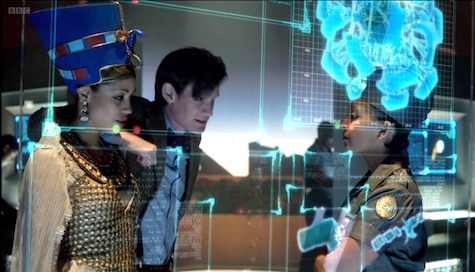
This actually addresses an issue that many fans have taken with Doctor Who across its near half-century run: because the Doctor is “the man in charge,” he has a tendency to make choices for his companions (and basically anyone who crosses his path). Because his companions are mostly women… that doesn’t make him look too great. A popular example in that arena is Donna Noble’s exit from the series; while emotionally we can understand the Doctor’s decision to save his friend’s life by wiping her memory, he ultimately doesn’t let her have a say in her own fate, to the point of ignoring her specific pleas not to take the knowledge from her mind. Here we see the opposite at work—a woman flat out tells the Doctor that he cannot make a choice on her behalf, and the Doctor backs off instantly.
In addition, we’re given the odious character of Solomon and his insistence that it is perfectly alright to view living creatures as property. Oddly, his point of view on the matter is not examined in regard to the dinosaurs that the episode is named for, but in how he treats Queen Nefertiti. He basically refers to her as chattel, insists that he owns her and as mentioned above, threatens to break her to his will. By the end of the episode, Nefertiti gets a chance to overpower Solomon, to prove to him that she cannot be seen or used as anyone’s possession. Every form of domination and intimidation that Solomon tries gets thrown back in his face, and he is left to the Doctor’s mercy in the end.
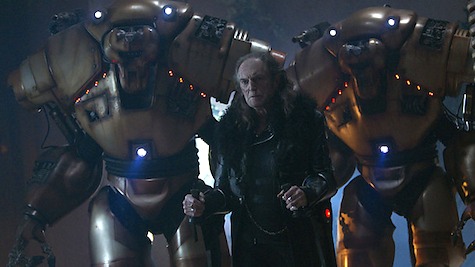
Which is where things start to get muddled. There’s a lot of talk currently about the Doctor’s decision to murder Solomon, something that the character is typically not known for doing so callously. What sort of message are we meant to take from the act? Do we feel that the Doctor was justified in his actions, and why? Is it because of what he did to the Silurians? His treatment of the Doctor’s friends? Or is it his specific treatment of the Queen of Egypt that puts him firmly in the “let him go up in flames” category? It would be nice to have some sort of closure there, but it’s never discussed, or even commented on.
Nefertiti’s choice to go with Riddell also leaves a lot to our imaginations. We’re told in the episode that King Akenaten, Nefertiti’s husband, is a disappointing bore, to which Amy comments that Nefertiti faces that sort of man or Riddell, the “walking innuendo.” While it’s intended as a joke, it sends an odd message when we know that the queen chooses to follow Riddell home: was that really the only choice for her—boredom or constant catcalls? Will she be able to teach Riddell how to respect a woman who is accustomed to freedom and power, or did she go with him for the adventure? We simply aren’t told.
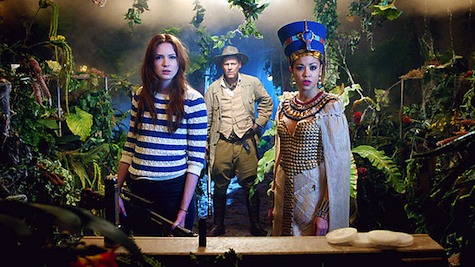
Combine that with the multitude of angles that the episode is intent on playing—Rory’s wonderful dad, the Indian Space Agency, the almost-appearance of the Silurians, the ark, sassy robots—and “Dinosaurs On A Spaceship” feels like it’s promising a lot that it’s not quite ready to deliver. Almost as though fan complaints were beginning to wear, and someone decided to chuck the whole kitchen sink (and a time rotor) at the Whoniverse.
While writer Chris Chibnall’s scripts have a clear range to them—I’m a fan of “42,” but I think we can all agree that the “Hungry Earth” two-parter is problematic at best—the final sign-off lands with Moffat, and it doesn’t help that the ark of this episode definitely seems like his standard cuppa. Being a television showrunner is undoubtedly one of the hardest jobs in the business, and Steven Moffat has been dragged through the internet firmament quite often recently (so much so that Benedict Cumberbatch made a supremely awkward joke about how un-sexist Moffat is at this year’s BAFTA Awards); perhaps that’s why Steven Moffat would prefer not to listen on Twitter anymore. On the other hand, it’s also possible that this episode was meant to be the perfect people pleaser. Give everyone what they want, no one will complain—give them tough ladies, aliens, dinosaurs, different ethnicities, new faces! Perhaps the fact that it didn’t work for everyone was one aggravation too many, and the departure from social media is just Moffat throwing his hands up at us. One can only hope that’s not the case.
It’s too bad because it would be exciting if Steven Moffat’s Who was planning on living up to the fragments of promise in “Dinosaurs On A Spaceship” — a move back to more diversity (be it age, color, or species), more fun in groups, more active female characters (who aren’t active because they’re brainwashed and/or unstable)—but at the end of the day, it’s more likely that what we got is all we’re getting for now. We got some adventure, some dinosaurs, some meaningful discussions, some new characters who it would have been nice to know better, and some family bonding to top it all off. It was fun—and Doctor Who should always, first and foremost, be about fun—but fun with just a bit more relevance would be much appreciated.
Emmet Asher-Perrin really wishes that Rory’s dad was going to be the new companion. You can bug her on Twitter and read more of her work here and elsewhere.










